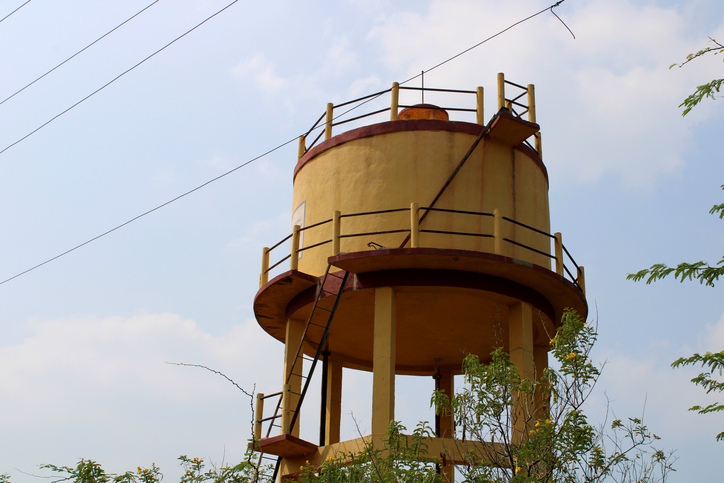
Vengaivayal Dalit atrocity: Probe picking up momentum, but activists sceptical

Nearly five months after the horrific incident of the dumping of human excreta in the overhead drinking water tank of a Dalit community in the remote hamlet of Vengaivayal (also known as Vengaivasal) in Tamil Nadu’s Pudukottai district came to light, the Criminal Investigation Department (CB-CID), which has taken over the case from the local police, is speeding up the on-the ground investigations.
The investigation is picking up momentum as CB-CID are questioning the witnesses, who were present during the incident, the operator of the overhead tank, and other suspects to find the culprits. But the activists remain sceptical about their real intention.
 DNA sample testing
DNA sample testing
In a first of its kind investigation, the suspects are giving their DNA samples to be tested. Initially, 11 samples were scheduled for testing and this has increased to 119 samples. The genetic test would be used to match with the fecal matter sourced from the overhead tank since the agency has cited the lack of witnesses.
Earlier, they had obtained statements from 147 witnesses after questioning them. But, there has been no breakthrough in the case that sent shock waves across the state and no arrests have been made till date.
In December 2022, many elders and kids were lining up for treatment at the Pudukkottai government hospital with symptoms like vomiting, diarrhea, and frequent fevers. The doctors advised them to check their drinking water supply system. When half a dozen kids were admitted to a hospital, the residents of the Dalit families in Vengaivayal village decided to check their overhead water tank.
Feature: How a Sri Lankan Tamil novel ‘foretold’ Vengaivasal caste atrocity
When the residents opened their overhead tank to clean it, they were shocked to find a lot of human fecal matter in the water. The case was initially probed by the Pudukottai district police and subsequently transferred to the CB-CID on January 14 this year by the director-general of police (DGP) C Sylendra Babu and the investigation has been going on for the last four months.
No legal recourse for such a heinous act
Understanding the horrific nature of the issue itself will take time, said A Kathir, founder and executive director of Madurai-based NGO Evidence, which fights for Dalit rights. But what makes it worse is that there is no legal recourse for such a heinous act.
The legal provisions used to identify such a horrible act itself is found wanting, he added, pointing out that Sec 3(1)b of the SC/ST Atrocities Prevention Act refers to an act of dumping excreta in the premises of a SC/ST member but not about mixing excreta in an overhead drinking water tank.
“You have to read it with sec 3(1)a, which deals with forcing a member from the SC/ST community to drink or eat an indelible or obnoxious substance, if you have to frame a foolproof case against the accused,” affirmed Kathir.
Activists are worried because the FIR doesn’t include 3(1)a and they fear that the culprits could get away with their terrible crime.
In fact, activists said that though the SC/ST Act was amended multiple times to address the issue of untouchability and discrimination inflicted against Dalits, the caste Hindus of the village in Pudukottai district allegedly have used an entirely new method not specifically mentioned in the Act.
Also read: For poverty-struck, caste-oppressed individual, does religion matter?
Attack on Dalits’ right to access to water
Dalits, who have been historically alienated from resources such as land and water, are now faced with having to live with the threat of their overhead tanks getting polluted. The fact that water supply was reaching their locality instead of them going in search of it was itself a liberation for Dalits, writes K Ragupathi, member, Tamil Nadu SC-ST state commission in his book ‘Dalithkalum Thannerum’ (Dalits and Water Resources).
Raghupathy in his book writes: “It (modernised water supply) helped Dalits overcome issues of access, as they needn’t cross the roads used by dominant castes to seek water or depend on wells, water resources under their control. But discrimination against Dalits was reported in such overhead tanks too in the past. Most of the tanks were installed in the dominant community areas giving them control of the water supply and putting the Dalits at their mercy. Widespread discrimination in the water supply and the quality of water supply led to building of overhead tanks exclusively for Dalit communities.”
The Vengaivayal incident now is an attack on Dalits’ rights to access their water needs, said activists.
Even though Ragupathy refers to incidents of polluting drinking water for Dalits with human excreta even in the 1940s, filling an overhead tank under the control of an elected local body with human excreta is viewed as an unprecedented shocking act.
Pinning the blame on victims
According to J Amirtha Lenin, a Dalit activist, instead of questioning the local body heads about the issue, there is an attempt to blame the victims and make it out as if they have done it themselves.
“Instead of quizzing the local body chiefs, many of the victims are being framed in the case in the name of DNA tests. People from dominant castes and authorities try to portray that Dalits themselves set their huts on fire, Dalits themselves pass stools in the water they drink. Such accusations reflect their casteist attitude. Who will drop their own faeces inside the water they drink?” asked Lenin.
Further, he pointed out that scores of people were admitted to the hospital after drinking the contaminated water in Vengaivayal speaks volumes of the horrible crime. “An attempt is being made to make witnesses as the accused,” Lenin said.
The complainants from Vengaivayal village have approached the Madurai bench of Madras high court to restrain CB-CID from “framing” victims in the case. The original complainants Muthukrishnan and Sudarsan have said that the notice issued to provide their DNA samples is an attempt to frame them in the case.
They have sought relief from the court to instruct investigating agencies to find the real culprits and not to blame the victims. The investigation hasn’t been on the right track from the start, said Kathir.
Activists sceptical about investigation
“After the complaint was made last December, they deliberately destroyed the evidence. As per the orders of the local panchayat leaders, the human excreta was cleaned and dumped in the open by sanitary workers. The tank was chlorinated and wiped of all evidence. Samples for conducting DNA tests were taken from the dump site after a four day delay. And attempts to match them with DNA samples are being done after months,” rued Kathir.
Even though advanced genetic tests are used for the first time in a crime against Dalits in this case, its efficacy is questionable, said Kathir. “It is technically not feasible to conduct DNA tests, various experts tell us. They cite multi-cell breakage which happens when excreta get separated from water. Identifying gender is also not possible based on fecal proof, we are told. Moreover, doing the DNA tests so late is a clear case of delaying the inquiry,” he said.
It is also pointed out that finding out human origin of the excreta is not going to fix the culprits. “It is the people who dumped the faeces into the overhead tank who have to be prosecuted. But 9 out of 11 people from whom CB-CID have demanded DNA samples are Dalits. Once objections were raised, the numbers were suddenly raised to 119, which appears mysterious,” said Kathir.
The district officials of Pudukottai who swooped down on the remote Vengaivayal village appeared to act swiftly. Even though the original complaint was about faecal matter deliberately mixed with Dalits’ drinking water, they stretched the inquiry about other discriminations too.
The collector and SP of the district ensured that the villagers could enter a temple barred for them and also acted upon the discriminatory two-tumbler system practices. But the issue of mixing fecal matter in their drinking water raised by the Dalits, remains unresolved till date. And, the people of this little hamlet are having to live with the public humiliation.
“The ruling DMK is obviously worried about losing the votes of backward communities who constitute larger numbers than the Dalits in this area. So, they tried to play down the issue. But the horrible nature of the act is not letting the issue die down,” said a government source. And, that is probably why the investigations have picked up momentum but it remains to be seen if they are able to nail the culprits who had committed the dastardly crime.

